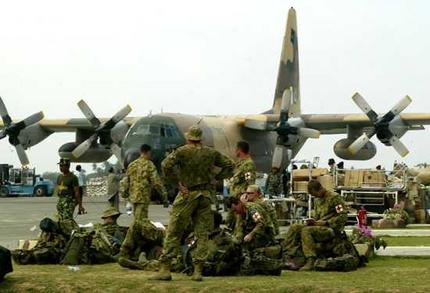This is a guest post by the Australian Strategic Policy Institute (ASPI) and Foundation for Development Cooperation.
ASPI and the Foundation for Development Cooperation gathered together an Independent Task Force made up of distinguished Australians with deep experience in public policy, development, business and national security.
The report argues that Australia’s aid program should be better fitted to enhance Australia’s national security.
Australia’s aid program is likely to double in the next four years; the program will increase from its current level of 0.33 percent of gross national income to 0.5 percent of GNI by 2015-16. Our aid program should become a more important element in Australia’s security strategies. AusAID needs to be brought more into decisions about national security.
The Task Force recommends that:
- The Australian Government should put more effort into explaining how Australia’s aid contributes to national security by preventing potential threats to the Australia developing. Australia should give higher priority to security in its aid initiatives in those cases where fragile states request it.
- AusAID’s Office of Development Effectiveness should have a statutory role and the Parliamentary Joint Committee on Foreign Affairs, Defence and Trade should establish a sub-committee on the aid program to provide parliamentary oversight.
- Australia should follow the example of the US in conducting a Quadrennial Diplomacy and Development Review which would enable government to re-examine the aid program every four years, paying attention to the links between our aid effort and national security.
- Australia should establish a new Minister for Overseas Development Assistance in the Foreign Affairs portfolio.
- Australia should maintain the new aid commitment to Africa, but not at the expense of the Asia-Pacific.
- Australia should maintain its aid focus in the South Pacific, an area where China is fast growing in importance as an aid donor, investor and trade partner; Australia has compelling security interests to remain predominant in this region.
- Australia should maintain its aid commitments to PNG.
- An increasing aid program provides the opportunity to expand Australia’s spending on climate change adaptation initiatives in Pacific countries.
- A separate security sector of the aid budget should be created to give recognition to the increasing importance of aid-security cooperation in the aid program and to provide greater transparency about aid expenditure by agencies such as the Australian Federal Police.
- In terms of civil-military cooperation in the delivery of aid there’s the need for a coherent government strategy to enhance civil-military cooperation.
Australia has a good international reputation for civil–military cooperation in the delivery of aid. Our experience of whole-of-government involvement in aid and emergency projects over the past decade has also built a valuable reservoir of regional knowledge and expertise across the Australian Public Service. What’s needed is a coherent strategy to enhance civil–military cooperation as the aid budget grows.
Task Force members were Peter Abigail, Sean Rooney, Melanie Aube, Anthony Bergin, Graeme Dobell, Stewart Firth, Peter Leahy, Bob Lyon, Alan McCagh, Bob McMullan, Camilla Schippa, Bob Sercombe, Michael G Smith, Carl Ungerer and Mark Vaile.



Leave a Comment